For centuries, reishi mushrooms have not only been a staple in eastern diets, but have been relied upon to treat and prevent diseases and ailments. However, it wasn’t until recently that western culture began to adopt these mushrooms, slowly but surely. This shift is directly related to the research and studies that have been conducted to showcase the true powers of reishi mushrooms and why they deserve a place among the top supplements in the world.
In this article, we explore what reishi is, the potential health benefits, how to take reishi as a supplement, and potential side-effects and interactions.
You can jump to the health benefits by clicking here.
Let’s start with the basics:
What are reishi mushrooms?
Reishi mushrooms (Ganoderma lucidum) are a variety of functional or ‘medicinal’ mushrooms.
There are over 80 known species of functional mushrooms, but the medicinal benefits are thought to be similar throughout. It’s unlikely you’ll find them in your backyard, as they are almost entirely cultivated in Eastern Asia thanks to its warmer climate, though certain species are known to occasionally grow naturally in South-Eastern parts of the United States, southern Europe, and the South Pacific.
Reishi mushrooms have a distinct look to them. In the wild, you would find them growing at the base of trees. Unlike many mushrooms, reishi grows horizontally from the tree, in a pancake-shaped type of pattern. It’s flat, large, and brown, with a shine to it that fades as it begins to age.
Can you eat it in the wild? Sure! But only if you have an expert mycologist to help you identify it. And even then you might not like to – reishi has a bitter taste and is pretty tough, which is why most get the benefits of it by taking it as a powdered extract, either mixing it in a drink, or taking it in a capsule/pill.
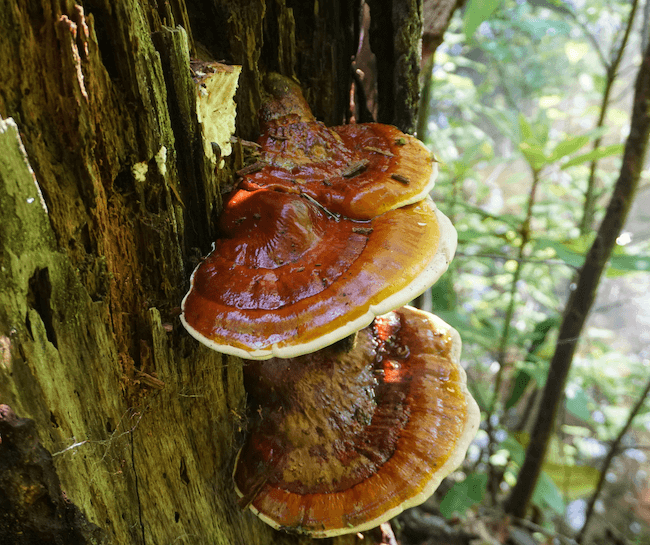
The history of reishi as medicine
Reishi has been used for over 2000 years in traditional Chinese medicine, and in Japanese culture, it has been referred to as the “immortality” mushroom. As we mentioned, it’s taken time for Western culture to adopt the use of medicinal mushrooms, largely in part to research lagging for certain species.
Reishi is one of the most well-known and studied medicinal mushrooms, with mountains of research pertaining to its potential benefits.
It’s not too often we find a supplement that addresses so many ailments and diseases, which is why reishi is regarded as the queen of all mushrooms.
Nevertheless, with any health supplement, research needs to continue to explore the effects.
Here are some of the potential benefits:
14 Health Benefits Reishi May Support
1. Strengthened Immune System
One of the leading benefits is reishi’s ability to boost the immune system. You’ll see in studies that the species of reishi identified is also known as Ganoderma lucidum.
The basis of the immune-boosting properties of reishi largely come from the polysaccharides found within the mushroom.
IN VITRO STUDY: The immuno-modulating effects of G. lucidum polysaccharides were extensive, including promoting the function of antigen-presenting cells, mononuclear phygocyte system, humoral immunity, and cellular immunity.
Polysaccharides are the most abundant carbohydrate in food, and in plants and fungi, have been linked extensively to modulating the immune system.
The polysaccharides that are present in some foods have biologically active properties, such as the ability to activate immune functions, inducing the production of antioxidant, anti-inflammatory and immune function regulating substances.
While more research needs to be done across all health supplements, including reishi and medicinal mushrooms, what we’re starting to see is that reishi has the potential to affect genes in white blood cells and can alter inflammation, along with boosting the immune system and helping to regulate immune response.
Reishi is also a well-known antioxidant thanks to the Ganoderma lucidum peptide that is still continuing to be discovered in depth. You can read more on this subject here.
2. Anti-Aging
IN VITRO STUDY: In a study done, reishi polysaccharide was shown to have anti-aging effects and increase life span in C. elegans, which is a model organism used to study health and disease.
STUDY WITH MICE: In mice, another study was done on a reishi extract, with findings that those taking the extract had a significant increase on lifespan.
And not only that, but the benefits of reishi and its effect on anti-aging properties tie into its ability to help with anxiety, stress, and more which may all aid in a healthy, longer lifespan.
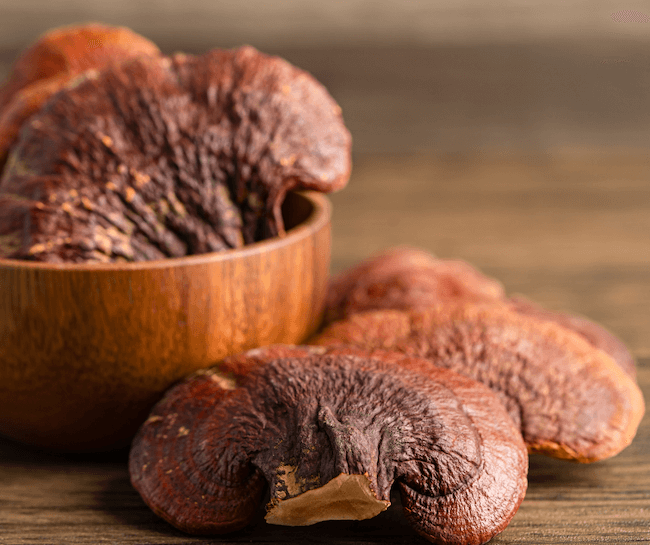
3. Anxiety Relief
One of the most common conditions in this fast-paced, hectic world is anxiety. Most either experience it themselves or know someone close to them that has suffered from it.
Reishi was used in a study to help with fatigue in breast cancer patients going through endocrine therapy.
HUMAN STUDY: The study had very positive insights, and in a high-stress time of the patients’ lives, these patients also reported less anxiety and depression and better quality of life.
Head over to our guide if you're interested in learning more about reishi for anxiety.
4. Lower Blood Pressure
A study done, comparing reishi to Losartan, an antihypertensive drug used to treat high blood pressure, was conducted in 2018.
The reason for the study is that many drugs have adverse side effects so the need for another remedy/treatment is definitely needed.
The study was done on rats.
STUDY WITH RATS: After 7 weeks, reishi therapy reduced blood pressure in experimental animals at a level comparable to that of losartan.
5. Cognitive/Neuroregenerative
STUDY WITH RATS: In that same study regarding blood pressure in rats, reishi introduction significantly increases cerebral blood flow and affects cerebral cortex metabolic patterns.
This suggests that reishi may act as a nootropic, which is a substance that boosts brain performance, helping with brain fog, better memory, and enhancing cognition.
Ganoderma lucidum (reishi) is known for its benefits on the nervous system. It has been used to manage different neurological disorders.
STUDY WITH MICE: This study was designed to look into the nootropic potential of the mushroom on mice using mazes. The study showed that for the “mice in which Ganoderma lucidum [reishi] extract was co-administered with scopolamine showed significant increase in time spent in target quadrant when compared with scopolamine alone administered group. This has proved that Ganoderma lucidum extract has potential of increasing the retention time of ongoing learning memory.”
STUDY WITH MICE: Another study on mice was done as well, reporting that the polysaccharides in Ganoderma lucidum “could serve as a regenerative therapeutic agent for the treatment of cognitive decline associated with neurodegenerative diseases.”
As you can see, studies on mice and rats are certainly not intended to be an equivalent or substitute for the need for human trials. Luckily, more studies and trials are underway, and the studies on mice and rats showcase the potential cognitive benefits of reishi.
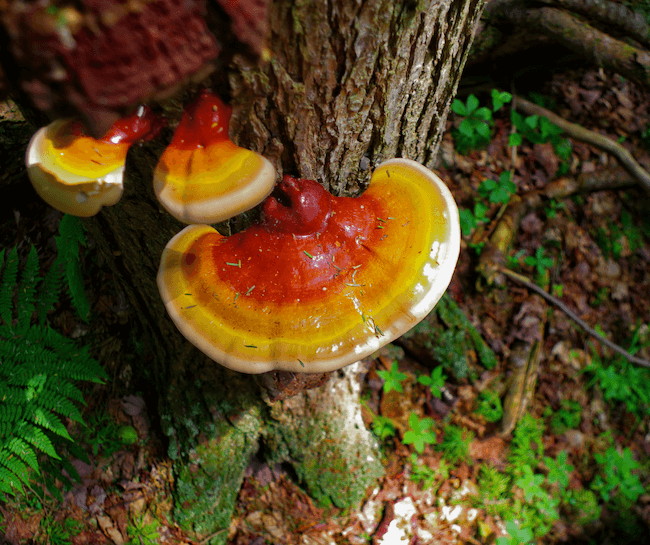
6. Depression
A growing concern in the medical field, reishi has been widely studied for its anti-depression properties, with many studies done on mice and more underway.
STUDY WITH RATS: Research suggests that the mushrooms has “antidepressant-like potential” and “suggest that MAK has antidepressant-like potential, which is most likely due to the antagonism of 5-HT2A receptors, and possesses anxiolytic-like effects toward memory-dependent and/or stress-induced anxiety in rats”
As with anything, more studies need to be done on human trials, though the reports so far are promising for the mushroom.
7. Allergy Relief
A study was done on guinea pigs with allergic rhinitis. Those familiar with seasonal allergies will know this feeling. Allergic rhinitis is an inflammation in the nose due to pollen, dust, mold, etc.
This particular study was pollen-based.
STUDY WITH GUINEA PIGS: The study “demonstrated that the pollen-induced biphasic nasal blockage and nasal hyperresponsiveness were suppressed by the daily treatment with Ganoderma lucidum (reishi) in the guinea pig model of allergic rhinitis.”
8. Cancer
Lab research and preclinical trials have suggested that G. lucidum (reishi) has promising anticancer and immunomodulatory properties.
HUMAN STUDY: In one human study, the polysaccharides from Ganoderma lucidum enhanced the immune responses in patients with advanced-stage cancer. Clinical evaluations of response and toxicity are ongoing.
It’s become more widely studied and research continues to be performed.
It’s also good to note that reishi can increase the activity of a white blood cell that is known as natural killer cells, and has been spoken about as a “search and destroy” property for cancer cells.
NK cells have been studied for their support of fighting infection and shielding our bodies against tumors. You can read more on the review here.
DOUBLE-BLIND HUMAN TRIAL: More pre-clinical findings also weigh in on Reishi and its ability to stimulate and boost the immune system during chemotherapy. “We enrolled 82 participants across 8 cancer centers in China. The median age was 59 years, 56 (68%) had advanced cancer. Compared with the placebo group, the RPF group had nonstatistically significant higher quality of life as measured by the FACT-L total score (P = .086) over 2 cycles of chemotherapy.”
Another suggests that Ganoderma lucidum may be an effective nutraceutical used in the prevention of cancer metastasis. Read more on this article here.
Again, even though multiple studies of reishi have been conducted, we are just at the tip of the iceberg and more research and human clinical trials need to be done.
Nevertheless, it’s one of the primary reasons that reishi is one of the few mushrooms with a world of research done already and is at the top of the list for the best of the functional mushrooms.
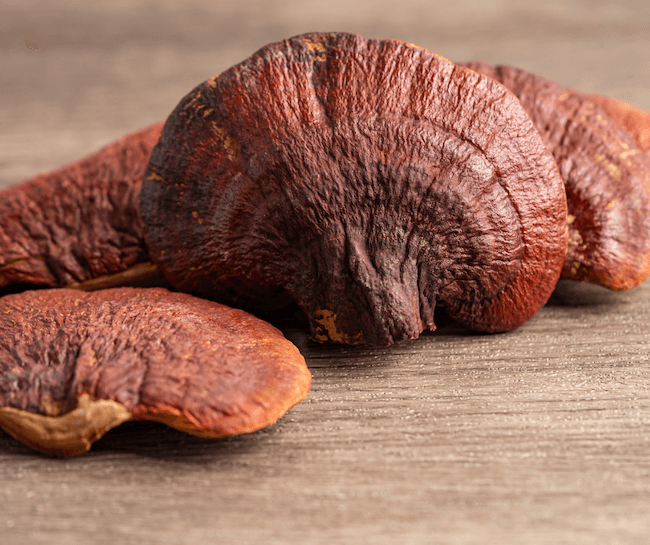
9. Lower Cholesterol
One word to familiarize yourself with is triterpenes. Triterpenes are a class of chemical compounds composed of three terpene units with the molecular formula C₃₀H₄₈.
Now, while you may not need to know the scientific background of them, triterpenes in plants and fungi have been linked to numerous health benefits.
For reishi, triterpenes have many potential benefits, including lowering cholesterol.
STUDY WITH HAMSTERS AND GUINEA PIGS: Overall, from this study, it was reported that “Ganoderma lucidum has potential to reduce LDL cholesterol in vivo through various mechanisms… Innovative new cholesterol-lowering foods and medicines containing Gl are envisioned.”
CONTROLLED HUMAN STUDY: Another study in 26 people suggested that reishi may improve good cholesterol, known as HDL.
HUMAN STUDY: However, another study with 398 people did not notice a change in cholesterol. It’s important to note that the author adds that due to a number of factors, the results of this study are muddied and that further research is needed.
10. Liver Function
Reishi mushrooms are suggested to help with overall liver function and health. As research shows, reishi may be a powerful antioxidant, which could be the reason for its positive effects on live health.
STUDY WITH MICE: A 2013 study suggested this and stated, “the results demonstrated that GLE induces hepatoprotective effects on acute liver injury induced by α-AMA; these protective effects may be related in part to the antioxidant properties of GLE.”
Another study done on hepatopathy (an abnormal or diseased state of the liver) was conducted with Ganoderma lucidum and stated “could represent a promising approach for the management of various chronic hepatopathies”. Read more here.
However, while reishi shows promising health benefits for a multitude of ailments, the mechanism in which it works needs to be further understood.
What are beta-glucans?
Many of reishi’s benefits are suggested to be attributed to its antioxidant properties in the proteins and polysaccharides, as well as beta-glucans.
Beta-glucans are another term to familiarize yourself with, as they are one of the key properties of all mushrooms and their health benefits. Learn more about them in this guide.
Beta-glucans are types of polysaccharides found in the cells of certain types of yeast, algae, bacteria, and most importantly fungi.
They’re known for their ability to act as “immunomodulators” facilitating a balance in a weak immune system, or regulating an overactive one.
We cannot create them in our bodies, so we must rely on ingesting them. Mushrooms, reishi included of course, are one of the best means of consumption for beta-glucans. It’s important that any product you take specifically lab-tests for this.
11. Weight Management/Obesity
IN VITRO STUDY: Lab studies have shown that the polysaccharides and triterpenes in reishi can prevent the development of new fat cells, thus has the potential to limit fat storage as well.
IN VITRO STUDY: Another study discusses the use of reishi (Ganoderma Lucidum) and its use in regulating blood sugar levels and inhibits alpha-glucosidase. This helps prevent that spike in glucose after eating a meal, which can lead to numerous health problems, especially as we age, and in those with diabetes.
12. Better Sleep
One of the biggest conditions in the world...poor sleep. reishi, studied for many conditions, has also been evaluated for its effects on sleep.
STUDY WITH RATS: A study done on rats was conducted over just 3 days. And in that short time period, Ganoderma Lucidum (reishi) “significantly increased total sleep time and non-rapid eye movement (NREM) sleep time.”
13. Fertility
The basis of reishi’s benefits when it comes to fertility lie in it’s stress-reducing properties as an adaptogen. Adaptogens are known to help our body adapt to psychological and environmental stress.
Reishi may strengthen the adrenal glands and reduce stress. For women trying to conceive, it may decrease the negative impact that stress has on their bodies and fertility.
There are no studies completed using reishi that relate specifically to fertility. All evidence here is strictly anecdotal. Research needs to be done to draw any definitive conclusions on using reishi for fertility.
We wrote a guide about reishi for fertility to help you understand more about this topic.
14. Fights Fatigue
STUDY WITH MICE: Multiple studies have been done, with one on mice suggesting that the extract of submerged fermentation of Ganoderma lucidum might significantly alleviate physical fatigue of the mice in vivo.
“The extracts of submerged fermentation of Ganoderma lucidum were also found to inhibit the accumulation of blood lactic acid, accelerate lactic acid clearance, improve glycogen reserve, and reduce glycogen consumption during exercise, resulting in less fatigue.” Read more on this subject here.
What are the common ways to take reishi mushrooms?
1. Reishi Mushroom Tea
If you’re already a lover of teas, this could be an easy addition to your routine. The teas are typically ground with other ingredients to improve the taste. You’ll likely see products that offer ground up reishi mushrooms, and other spices, that require a long steep (typically 30 minutes or more to release the beneficial compounds as well as brew a more delightful cup!)
We put together a guide to reishi tea here.
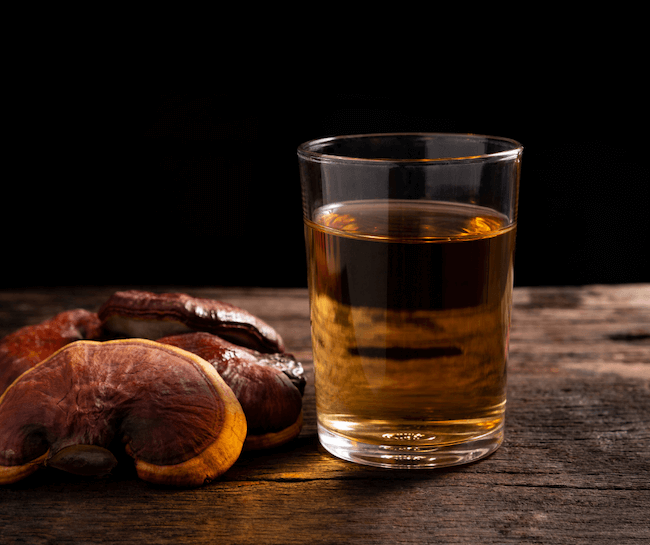
2. Reishi Mushroom Coffee
There are more and more coffee alternatives on the market, many using reishi powder extract as an addition to them. Some products are combined with coffee, while others are a coffee alternative and may include reishi and other species to give consumers the desired effects they are looking for.
3. Reishi Mushroom Tinctures (Liquid Extract)
Extracts are the most potent form of mushrooms and take a long time to produce. Why? Because it’s extracting all of the best properties of the mushrooms, typically through a hot water and alcohol extraction to release the beneficial compounds and substrates, that you wouldn’t receive by eating the mushroom whole. As humans, we can’t break down the tough cell walls of mushrooms, so we need this extraction process to take place.
Liquid extracts will likely be the most bioavailable of the ways to supplement with reishi mushrooms. Check out our guide to some of the best mushroom supplements here.
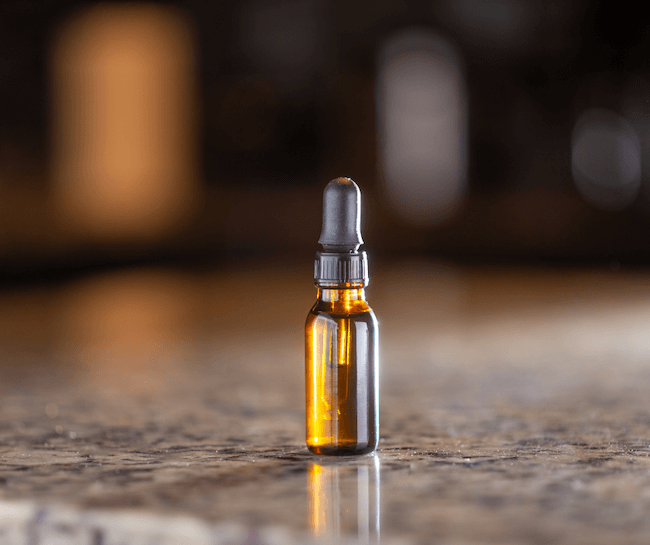
4. Reishi Mushroom Powder (and Capsule) Extracts
Powdered extracts go through a process to release the beneficial properties of reishi mushrooms. Typically, mushrooms are harvested, dried, and then crushed into a fine powder. They then go through a hot water and/or alcohol extraction to produce a liquid (much like you’d get in a tincture) and then it is often spray-dried and made into a powder once again. All to make the polysaccharides and triterpenoids bioavailable. If you’re looking for something to add to your drink, powders may be for you.
If you’re not interested in the taste (it’s rather earthy), you may choose capsules. We've compiled a list of the top capsule brands here.
Reishi dosage
As with any supplement, food, what have you, dosages are going to be different depending on age, weight, condition being treated, etc.
For reishi, the typical dose for extract/powder is 1000mg (1 gram) to 2000mg (2 grams) daily.
It’s important to note that studies have also been done with 1800mg given per day for 12 weeks and 3000mg given per day for 16 weeks.
If eating dried reishi mushroom by itself, the daily dose increases to 1.5g to 9g. This increase is because extracts have a higher potency than eating the mushroom by itself.
For tinctures/liquid extracts, the recommended dose is typically 1ML per day.
- Powdered Extract → 1000mg (1g) - 2000mg (2g) per day
- Liquid Extract → 1ml (1000mg (1g) per day)
- Dried Whole Mushroom → 1.5 to 9g per day
For more dosing information, check out this guide here.
Potential side effects of reishi mushrooms
It is important to consult your physician, especially if you are pregnant or breastfeeding. Always take precaution when necessary.
Dryness in mouth, throat, and nasal passages may likely be due to an allergic reaction.
Other potential side effects include:
- Stomach upset
- Dizziness
- Itchiness
- Rash
- Headaches
- Nosebleed
- Bloody stools
At Risk: If you’re taking a blood thinner, you should consult a doctor or physician as it’s been shown that it may react to this. Patients with diabetes taking medication to lower cholesterol should also contact a physician, as reishi has shown to have properties to lower this and combining with other medications may pose a risk.
It’s always important to speak to your doctor about any supplements you’re taking so that they can check on any potential side effects with medications or food.
Other reishi warnings
If taking other drugs and medications, it’s important to consult your physician, as they will have the medical understanding of any negative effects of using reishi with your current prescriptions.
If pregnant or breastfeeding, please also discuss the use of reishi with your physician.
Where can I buy reishi mushrooms?
If you’ve decided that you’d like to buy reishi mushrooms, you won’t have a hard time finding products out there! We've put together a couple of guides to help your search. Check them out:
There are countless companies selling them online as well as apothecaries that may be right near you!
A simple Google search will yield tons of results, but the better question is…
How do I choose the right reishi mushroom product?
To keep it short, you’re going to want to look for a few components within the company you’re trying to purchase from and their nutritional information for their reishi products.
The problem is that with this new influx of companies and the “mushroom boom” happening, there are a lot of companies that are cutting corners and selling products that are of low quality.
And who wants to buy a product that isn’t actually going to help them?? Not us!
For more on reishi mushroom products, check out our list of the top medicinal mushroom supplement brands on the market today.
Reishi mycelium vs fruiting body
For starters, look for products that have the fruiting body of the mushroom by itself, or a “Full Spectrum” product that contains the fruiting body and mycelium.
- Fruiting body is what you think of when you think of mushrooms. It’s the visible portion of the mushroom. Sometimes referred to as the cap.
- Mycelium is the root-like system underneath the mushroom that grows, breaks down, and absorbs the nutrients, eventually allowing the fruiting body to grow.
Both have beneficial properties if cultivated correctly. With the fruiting body, you know that you’re getting a mushroom grown to maturity.
So which kind of reishi product should you buy?
If you’re buying a “full spectrum” product that contains both, you just want to make sure that they are letting the mushroom reach maturity so that the mycelium has been able to absorb the nutrients effectively.
Many new companies aren’t letting the mushroom mature, but instead are just selling mushroom mycelium that does not contain the beneficial properties of the whole mushroom.
They grow the mycelium on grain or rice and if they don’t allow it to reach maturity, you’re essentially getting the nutrients and starch from the grain/rice and not the actual mushroom.
If a product only lists mushroom mycelium and nothing about the fruiting body, it’s unlikely that it is going to be the best quality.
Believe us, it’s tough to navigate the industry! That’s why we’re here!
One of the best things you can do is to check out the nutritional label and website of the company.
While mushrooms are relatively “new” to the Western world, there ARE companies that do third party lab testing. If a company does not, it’s smart to consider that a red flag. While expensive, it assures the quality of the product.
When buying reishi mushrooms, particularly extracts, make sure the company can supply third-party lab tests and are able to list the beneficial compounds.
Specifically, look for 1,3 and 1,6 Beta-Glucan percentages and triterpenoids.
Remind me, what are beta-glucans again?
Beta Glucans are soluble fibers that, in this case, come from the cell walls in fungi/mushrooms. Fungal beta glucans have shown a severe, positive impact on the immune system, which is why each product you buy should list the percentage of them.
Terpenoids are a bioactive compound found in mushrooms and plants. You’ll see it used widely. They have been highly studied for their therapeutic and medicinal benefits. Each plant produces different terpenes, in reishi’s case, triterpenoids.
Those third party tests should provide product safety for you including lead, heavy metals, among other compounds, to assure that what you’re taking isn’t going to harm you!
And lastly, if you have questions, ASK the company you’re thinking about buying from.
It’s a no brainer.
If they can’t answer simple questions about what we’ve covered here, you can rest assured that their reishi mushroom product probably isn’t the best.
Companies who excel will be the ones helping to educate consumers, not deceive through marketing in order to turn a profit and take advantage of people looking to improve their health.
Final notes on reishi mushrooms
While reishi has been regarded as an incredible natural remedy and used for thousands of years in traditional Chinese medicine, we’re still just learning about its potential benefits.
If you're ready to keep learning, check out our educational reishi hub here.
Even though it’s a staple in Eastern culture, we are still lacking the scientific research to support possible health and wellness claims.
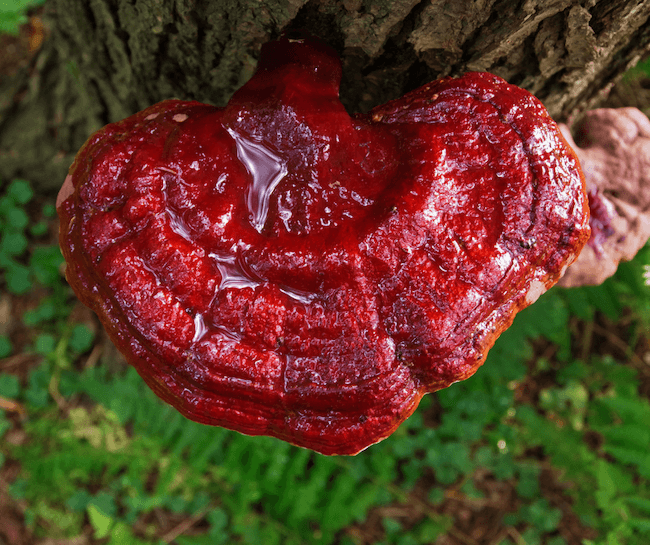
However, the studies of reishi have are increasing rapidly. And as medicinal mushrooms become more mainstream, we expect to get more information and will continue to update these articles.
At Remeday, our job is to educate and help people understand the potential benefits (as well as side effects) of mushrooms. We act as a resource for information and by no means should any of this be construed as medical advice. We respect and support doctors and physicians and recommend always consulting them before the use of any health supplements, medicinal mushrooms included.
Shop smart!
Do your research and never be afraid to ask questions!
Companies who want your business, and DESERVE your business, will be able to provide the answers to any of your questions!

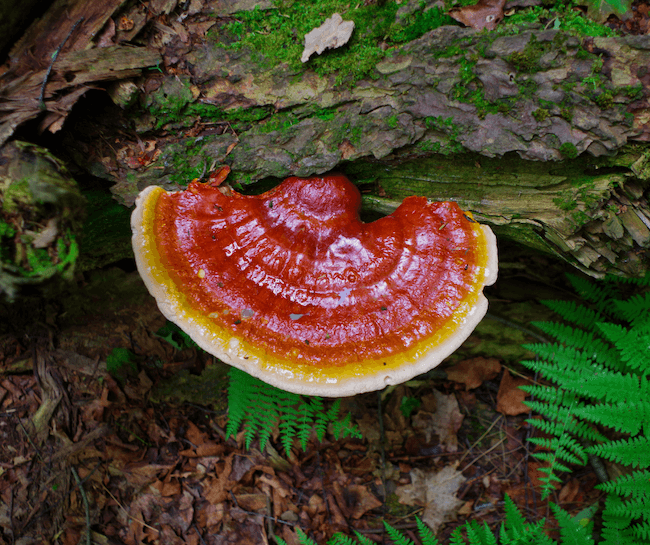
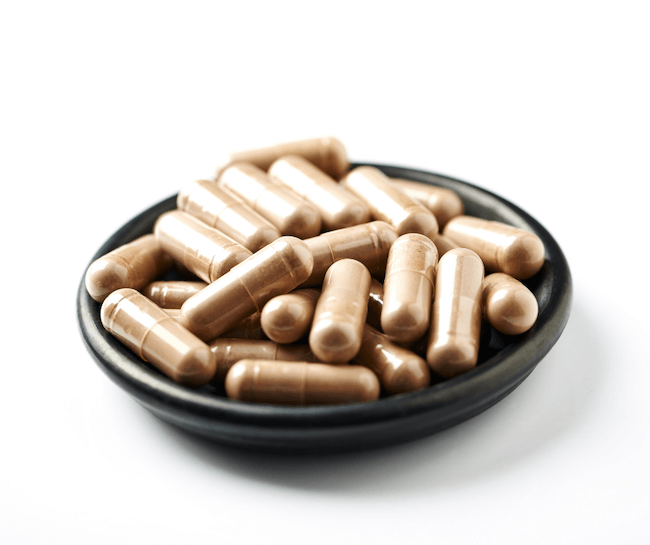
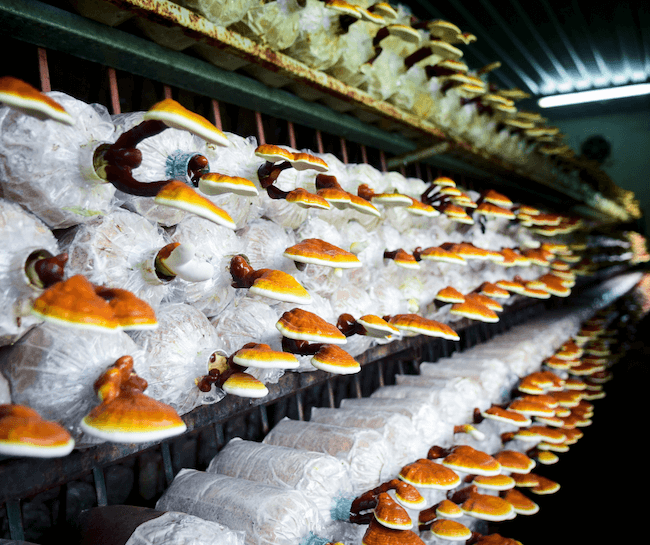
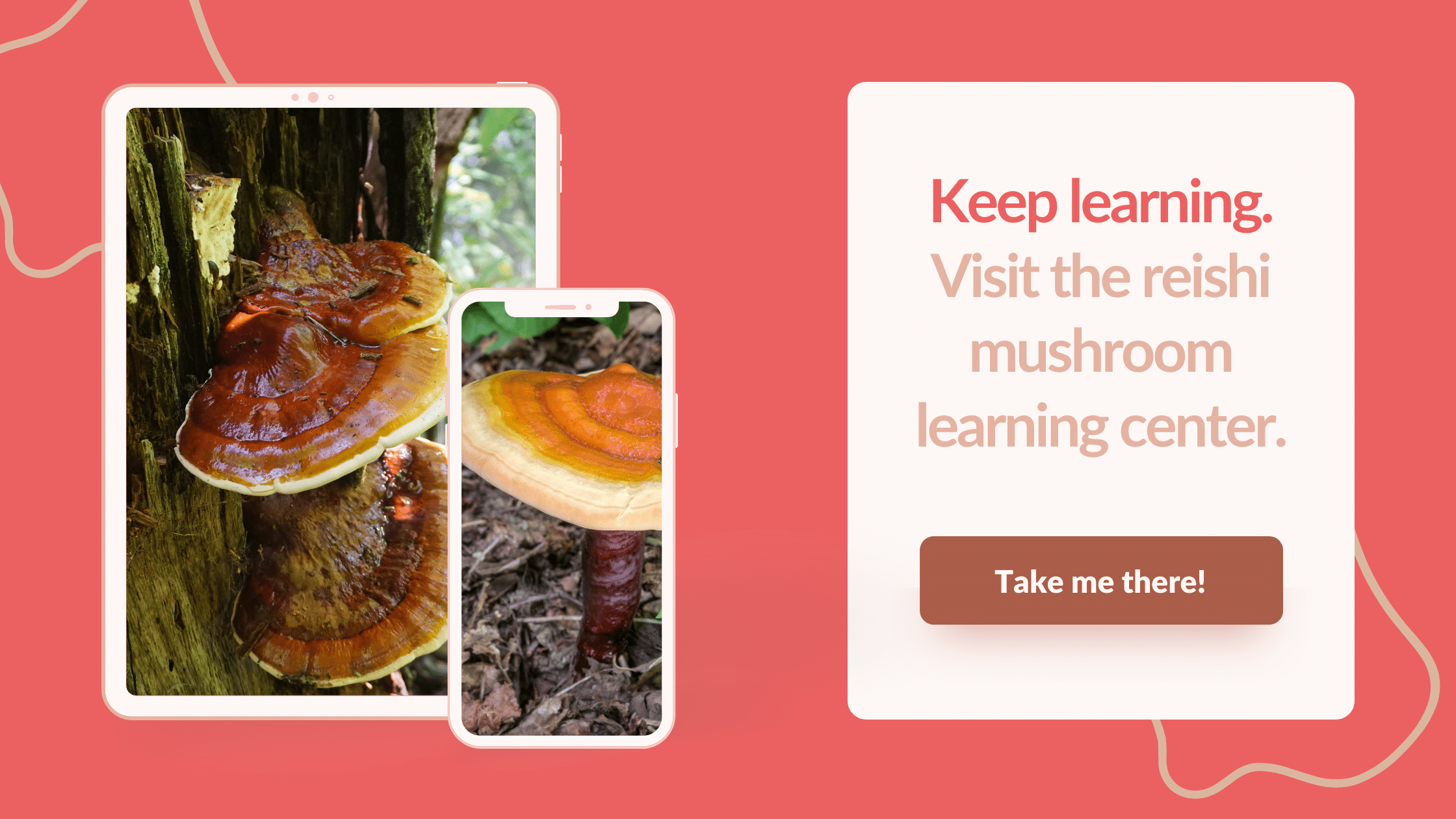
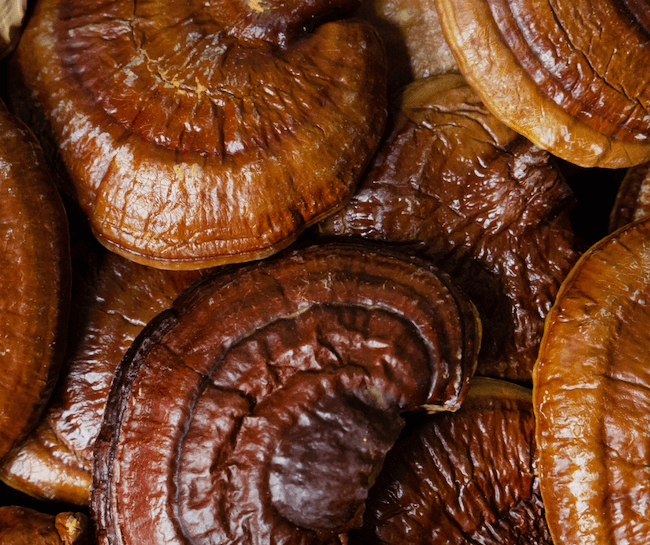
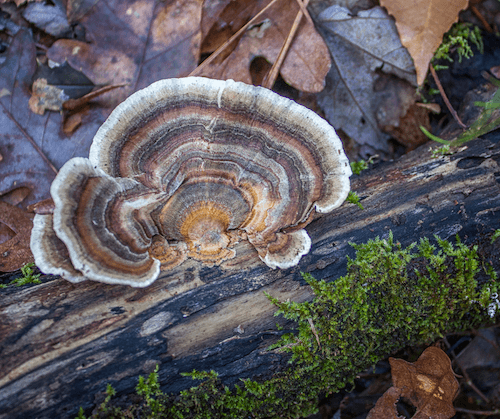


.png)
